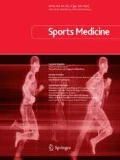Abstract
This review examines the question of whether performance-enhancing drugs should be permitted in sport under the control of physicians, and evaluates the expected outcomes of such a scenario. Such a change in regulation would need to be tightly controlled because of the risks involved. The results of legalizing performance-enhancing drugs in competitive sport would be either unhelpful or negative, and the unwanted aspects of doping control would not disappear. Athletes, including children and adolescents who wanted to pursue competitive sports, would be forced to take additional, avoidable health risks. The ‘natural lottery’ of athletic talents would be compensated for only partially by use of performance-enhancing agents. It would also be complemented by another ‘natural lottery’ of variable responses to doping measures, combined with the inventiveness of doping doctors. There would be no gain in ‘justice’ (i.e. fairer results that reflected efforts made) for athletes as a result of legalizing doping. Legalization would not reduce restrictions on athletes’ freedom; the control effort would remain the same, if not increased. Extremely complicated international regulations would have to be adopted. The game of the ‘tortoise and the hare’ between doping athletes and inspectors would remain because prohibited but not identifiable practices could still provide additional benefits from use of permissible drugs. Audience mistrust, particularly toward athletes who achieved outstanding feats, would because it would still be possible that these athletes were reliant on illegal doping practices. Doping entails exposing the athletes to avoidable risks that do not need to be taken to increase the appeal of a sport. Most importantly, the function of sport as a role model would definitely be damaged. It is not necessary to clarify the question of what constitutes the ‘spirit of sport’ and whether this may be changed. From a practical point of view, a legalization of performance-enhancing drugs in sport should not be considered for the simple reason that it has no advantages but many disadvantages.
Similar content being viewed by others
Notes
In this respect, the contention by Foddy and Savulescu is unconvincing. They state that it is ldmuch easier to eliminate the anti-doping rules than to eliminate doping,”[3] an assertion that appears to contradict their conclusion in another context that the amount of control needed would increase for safety reasons if legalization occurred.[2]
If it could be guaranteed that a sport was now free of the use of performance enhancers, the ‘old’ records could
References
Striegel H, Ulrich R, Simon P. Randomized response estimates for doping and illicit drug use in elite athletes. Drug Alcohol Depend 2010 Jan 15; 106 (2-3): 230–2
Savulescu J, Foddy B, Clayton M. Why we should allow performance enhancing drugs in sport. Br J Sport Med 2004; 38: 666–70
Foddy B, Savulescu J. Ethics of performance enhancement in sport: drugs and gene doping. In: Ashcroft RE, Dawson A, Draper H, et al., editors. Principles of health care ethics. 2nd ed. London: Wiley, 2007: 511–20
Savulescu J, Foddy B. Sports ethics: an anthology. Br J Sports Med 2005; 39: 686–7B
Fost N. Banning drugs in sports: a sceptical view. Hastings Center Report 1986 Aug; 16 (4): 5–10
Digel H. Warum doping niemals erlaubt sein darf. Edition Ethik Kontrovers 2001; 9: 63–7
President’s Council on Bioethics. Beyond therapy: biotechnology and the pursuit of happiness. Washington, DC: President’s Council on Bioethics, 2003
Schänzer W, Thevis M. Doping im sport. Medizinische Klinik 2007; 102: 631–46
Maiworm H. Doping gehört zum Leistungssport [online]. Available from URL: http://wandern-philosophieren.blogspot.com [Accessed2010 Oct 27]
Murray TH. The coercive power of drugs in sports. The Hastings Center Report 1983; 13 (4): 24–30
Bette KH, Schimank U. Doping: der entfesselte Leistungssport. Aus Politik und Zeitgeschichte: Beilage zur Wochenzeitung Das Parlament 29, 2008 [online]. Available from URL: http://www.bpb.de [Accessed2010 Dec 1]
Luhmann N. Die Ehrlichkeit der Politiker und die ho here Amoralität der Politik. In: Luhmann N, editor. Die Moral der Gesellschaft. Frankfurt am Main: Suhrkamp, 2008: 163–74
ZEKO. Zentrale Kommission zur Wahrung ethischer Grundsatze in derMedizin und ihrenGrenzgebieten (Zentrale Ethikkommission) bei der Bundesärztekammer. Doping undärztliche Ethik. Deutsches ärzteblatt 2009; 106: A 360–4
The Albert Camus Society of the UK. Albert Camus and football [online]. Available from URL: http://www.camussociety.com [Accessed 2010 Oct 27]
Grupe O. Doping und Leistungsmanipulation aus sportethischer Sicht. In: Digel H, Dickhuth HH, editors. Dopingim Sport. Tu bingen: Attempto, 2002: 58–76
Acknowledgements
The author would like to thank Professor Andreas Nieß for his helpful suggestions, and members of the Working Group ‘Doping’ of the ‘Zentrale Ethik-Kommission bei der Bundesärztekammer’ (Central Ethics Commission at the German Medical Association) for stimulating discussions on the topic.
No funding was used to assist in the preparation of this review. The author has no conflicts of interest that are directly relevant to the content of this review.
Author information
Authors and Affiliations
Corresponding author
Rights and permissions
About this article
Cite this article
Wiesing, U. Should Performance-Enhancing Drugs in Sport be Legalized under Medical Supervision?. Sports Med 41, 167–176 (2011). https://doi.org/10.2165/11537530-000000000-00000
Published:
Issue Date:
DOI: https://doi.org/10.2165/11537530-000000000-00000




